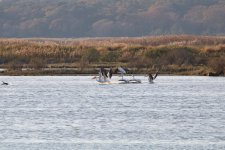dak
Well-known member

I live in the Mid-Atlantic region of the US. I am old enough that I have witnessed climate change in many ways. 40 years ago all the lakes around here would freeze over for a couple months. I used to walk across a lake to get to class. The daytime highs were usually in the 30s (about 2 C), this winter has been in the 40s and 50s.
Regarding birds, I wasn't a real birder back then, but I knew the common species from going out fishing or canoeing and being a nature freak in general. Back then I didn't see robins during the winter. The robin was the harbinger of spring. Now it's the harbinger of all seasons. The same with bluebirds and warblers. I never saw herons, egrets, sandpipers, or cormorants during the winter. I only heard second hand about the egret and cormorant, but the rest I have seen.
I think it would be interesting to see what changes in bird presence people have noticed in their areas over time.
Regarding birds, I wasn't a real birder back then, but I knew the common species from going out fishing or canoeing and being a nature freak in general. Back then I didn't see robins during the winter. The robin was the harbinger of spring. Now it's the harbinger of all seasons. The same with bluebirds and warblers. I never saw herons, egrets, sandpipers, or cormorants during the winter. I only heard second hand about the egret and cormorant, but the rest I have seen.
I think it would be interesting to see what changes in bird presence people have noticed in their areas over time.







